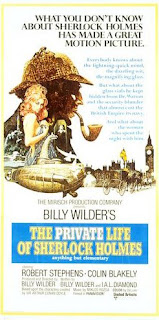 36 years ago this week (October 29th, to be precise) saw the release of legendary director Billy Wilder‘s grandest production — The Private Life of Sherlock Holmes. The movie, intended as a “road show” extravaganza costing the then princely sum of $10 million, turned out to be the director’s biggest flop, grossing only $1.5 million to date.
36 years ago this week (October 29th, to be precise) saw the release of legendary director Billy Wilder‘s grandest production — The Private Life of Sherlock Holmes. The movie, intended as a “road show” extravaganza costing the then princely sum of $10 million, turned out to be the director’s biggest flop, grossing only $1.5 million to date.
Kicked to the curb and buried early on, the movie has since enjoyed a critical reputation inversely proportional to its contemporary appeal. Boasting no marquee stars as such, the film was cut from its original running time of three hours to a more manageable two and change. Unfortunately the trimings, which comprised two more discrete stories, have been lost to time with only audio clips and stills surviving.
Nevertheless, Private Life is an immensely enjoyable flick, combining a rarely seen mixture of humor and sadness, genuine romance and gothic thrills as well as a superlative performance from star Robert Stephens, who plays the great detective as an acidic-tongued fop, a characterization which stirred a bit of controversy back in 1970 — “Were Holmes and Watson (gulp) GAY?” The question is addressed directly in the film — as is Holmes’ drug use — although the answer is never elementary.
Stephens handling of I.A.L. Diamond and Wilder’s funny and fast-paced script may have as much to do with the film’s reception than anything else. Basil Rathbone‘s more sober performance as Sherlock in the ’40s film series was (and still is) in the interested public’s mind at the time and Stephens’ preening was seen by some as blasphemy.
You don’t have to be a Sherlock Holmes fan to “get” Private Life. The film is a beautifully lensed satire of Victorian mores and modern day manners. The point is drawn even finer in the film’s missing prologue, preserved in script form as an extra on MGM’s 2003 DVD, where Dr. Watson’s grandson is led to the unpublished manuscripts of his grandfather.
The MGM DVD is not without its problems. Dark scenes in the film are marred by black halos which obscure the rather severe 2:35 matting. Color problems plague certain scenes and fading is evident throughout. The mono audio track is adequate allowing Miklos Rozsa‘s excellent, bittersweet score to shine. The extras, as mentioned earlier, are pretty extensive, with scripts, stills and audio bits filling in key, deleted scenes. Stick around for interviews with editor Ernest Walter and co-star Christopher Lee. Fascinating but probably a bit much for the average viewer.
I fell in love with this film after seeing it a few years ago and consider it more than a lost classic. Actually, I might nominate this as one of my favorite films of all time. And although it would be interesting to see the deleted scenes restored, I can’t help believe that The Private Life of Sherlock Holmes is as good as it can be which in this case is almost cinematic perfection. Highly recommended.
DVR’d this on TCM a few months back. Dug it too. (perhaps not as much as you- though your high praise makes it a sure candidate for a second look next time round…)